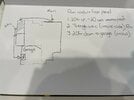Really appreciate all of the advice guys.
So I finally got a second electrician out. I went with a local place that does a lot of Tesla charger installs and is certified by Tesla etc etc and I showed the guy around and asked him what my best option is.
He also quoted me about $2900 with a totally different idea.
I drew a rough sketch which I’ll add but my diagrams suck. His idea was to go up the rear exterior of the house from the main panel, over to the attic, through the attic and then down to the exterior of the garage.
Like I mentioned before, this is all necessary because I’m in an attached townhome with the panel at the rear on the opposite side of the garage, which faces front.
So for this I would need this stuff.
1. 60ft of outdoor 1.5” weather resistant conduit (20 up, 20 over, 20 down)
2. 15ft of indoor cable to go through the attic.
3. State taxes and permits and all that.
4. New breaker and the actual outlet install for a 14-50 NEMA
Like some thought, he didn’t love the idea of any sort of adapter on the dryer switch and didn’t want to convert a 120, saying it’s risky and his employer only lets them do stuff that’s all to code.
Does anyone have a sense of if this is fair? I really don’t have any experience here all I can do is google the price of stuff. What he said made sense to me, but was definitely more expensive than I hoped. Maybe this is just an expensive job?
So I finally got a second electrician out. I went with a local place that does a lot of Tesla charger installs and is certified by Tesla etc etc and I showed the guy around and asked him what my best option is.
He also quoted me about $2900 with a totally different idea.
I drew a rough sketch which I’ll add but my diagrams suck. His idea was to go up the rear exterior of the house from the main panel, over to the attic, through the attic and then down to the exterior of the garage.
Like I mentioned before, this is all necessary because I’m in an attached townhome with the panel at the rear on the opposite side of the garage, which faces front.
So for this I would need this stuff.
1. 60ft of outdoor 1.5” weather resistant conduit (20 up, 20 over, 20 down)
2. 15ft of indoor cable to go through the attic.
3. State taxes and permits and all that.
4. New breaker and the actual outlet install for a 14-50 NEMA
Like some thought, he didn’t love the idea of any sort of adapter on the dryer switch and didn’t want to convert a 120, saying it’s risky and his employer only lets them do stuff that’s all to code.
Does anyone have a sense of if this is fair? I really don’t have any experience here all I can do is google the price of stuff. What he said made sense to me, but was definitely more expensive than I hoped. Maybe this is just an expensive job?



